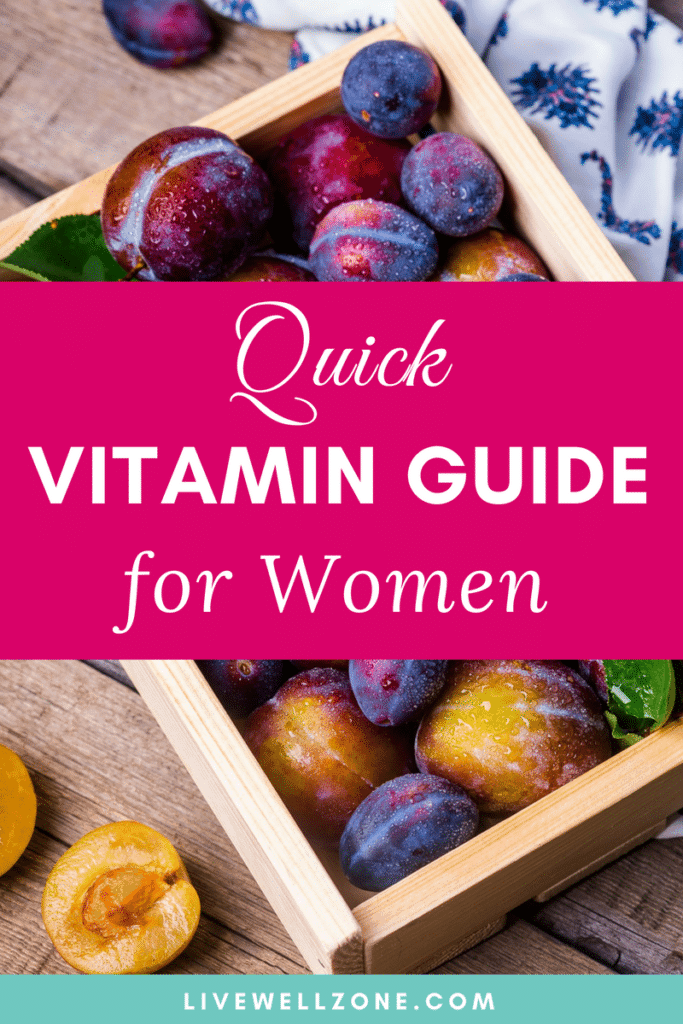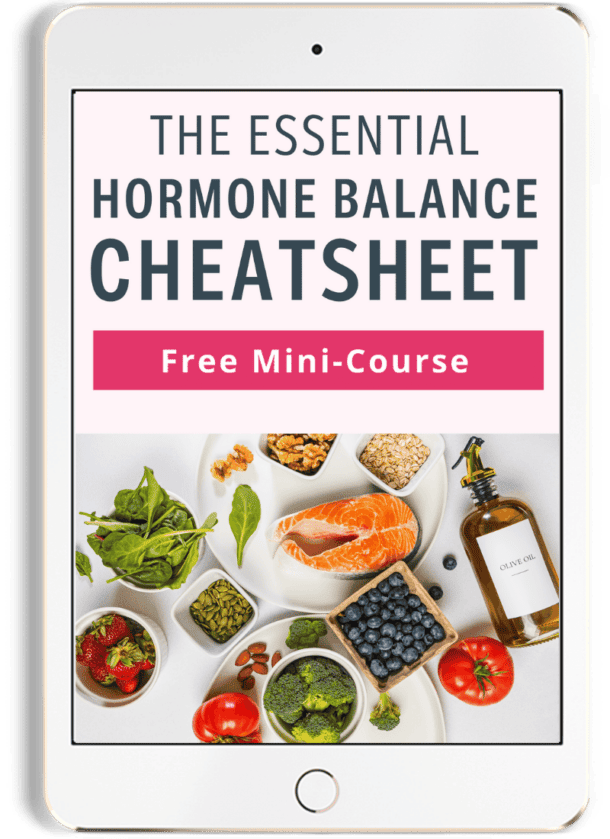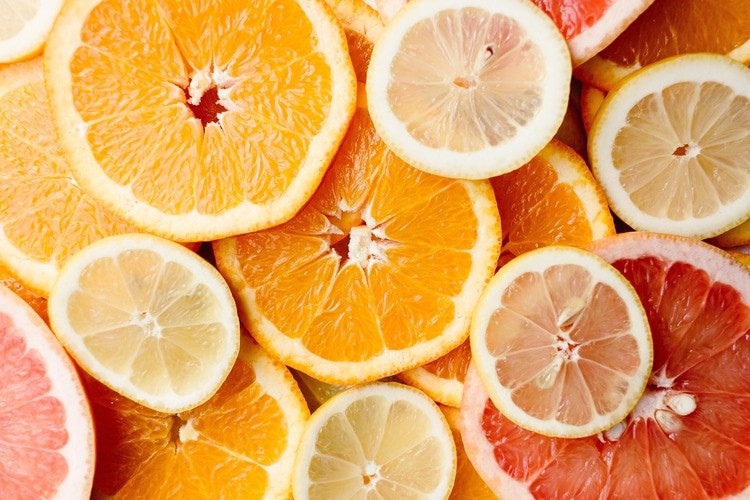
So you know that your body makes vitamin D when exposed to the sun.
And you were likely taught to eat oranges to get your vitamin C.
But, why?
Why should you care about vitamins in the first place and what exactly do they do for you?
Keep reading for all the details (as well as some of the best food sources for these nutrients)!
Note: This post also contains some affiliate links and I earn a commission (at no additional cost to you) if you use them to make a purchase.
WHAT ARE VITAMINS?
Vitamins are “a group of substances that are needed for normal cell function, growth, and development” – (source).
Pretty straightforward, right? But you could say that about any nutrient.
So, let’s expand on this a little more. Vitamins are actually:
- Organic compounds: They contain carbon and hydrogen. Depending on the vitamin, other elements like oxygen, nitrogen, sulfur, phosphorus and more can also be present.
- Necessary for almost every process in the body: Energy production, hormone production, blood clotting and immune function are all affected by vitamins.
- Essential for energy extraction: When we eat fats, proteins and carbohydrates the body has to extract energy from those macronutrients. And for this to happen, the body needs vitamins.
- Needed in small amounts: When the body is in balance, we need small amounts of vitamins in order to function properly.
- Found in all foods: The amount of vitamins in each food varies, That said, everything from the usual suspects – like fruits and veggies – to the less obvious suspects – like dairy, fish and grains – contain vitamins.
HOW VITAMINS WORK AND FOOD SOURCES
Vitamins fall into 2 main categories: water-soluble vitamins and fat-soluble vitamins.
Each category of vitamins performs different functions in the body and they’re stored in different ways.
1. WATER-SOLUBLE VITAMINS
Water-soluble vitamins dissolve in water and they’re absorbed in water. The body does not store these vitamins.
This means that as you eat them, they’re immediately used up by the body and any excess is eliminated in your pee.
Because water-soluble vitamins are not stored in the body, it’s important to have a steady, daily supply of them from our diet.
Otherwise, we run the risk of becoming deficient and developing nasty symptoms.
There are 9 water soluble-vitamins in total and their health benefits range from producing DNA and hormones, to preventing wrinkles and metabolizing fat.
1) Vitamin C
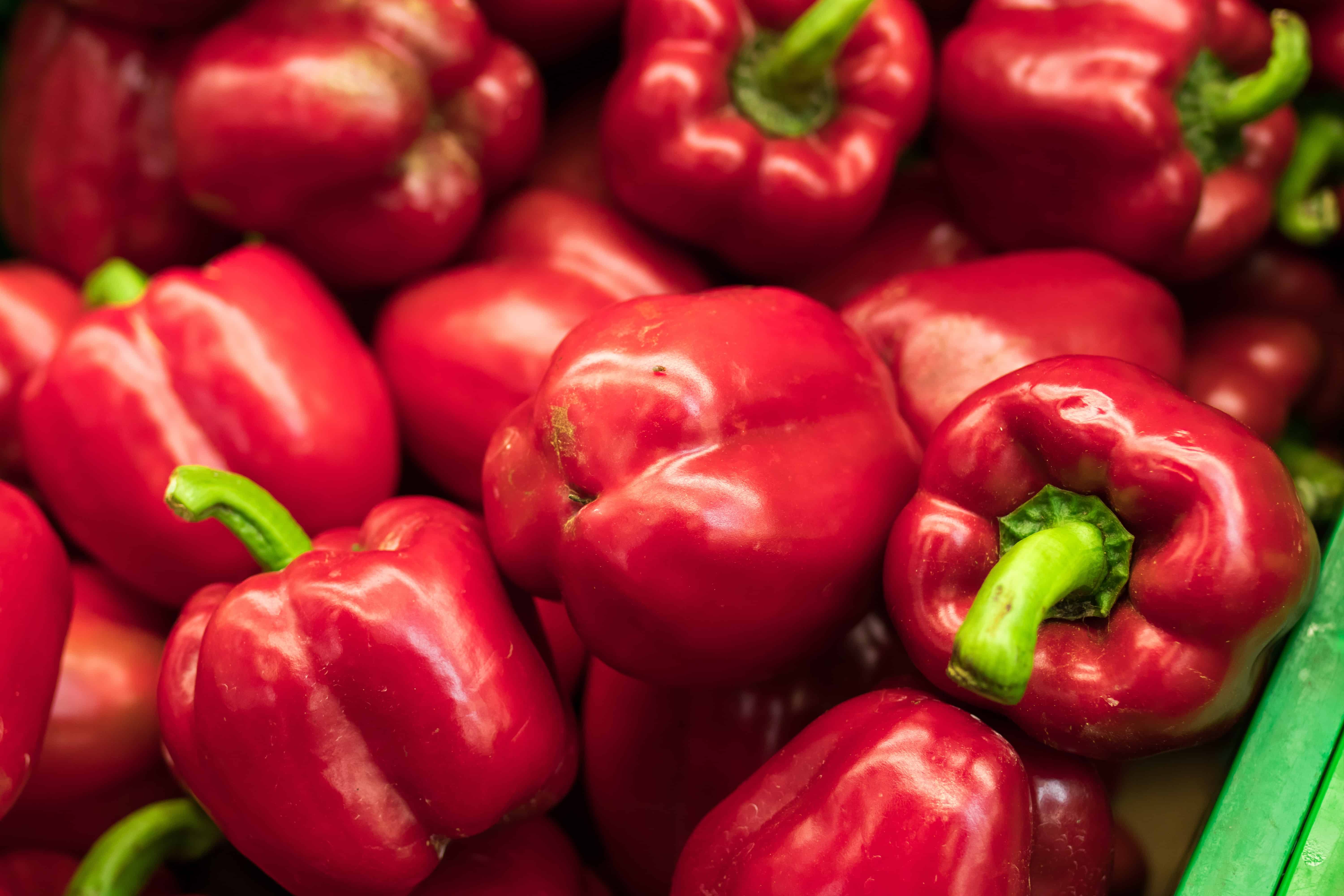
Without a doubt vitamin C is the celebrity vitamin. And for good reason!
It’s one of the most powerful antioxidants available to us, which protects us from the many symptoms that are commonly associated with getting older.
Vitamin C is also essential for collagen production, which helps us maintain healthy bones, cartilage, tendons and ligaments.
Collagen is also key for keeping the skin firm, which is why so many skin care products feature vitamin C on their packaging.
Last but not least, Vitamin C is also useful for the synthesis of various neurotransmitters, for the conversion of dopamine to serotonin and other actions related to the nervous system (source).
FOOD SOURCES: Red bell peppers, green bell peppers, oranges, papayas, green leafy veggies, cantaloupe, sweet potatoes, guavas, brussel sprouts, limes, lemons, pineapples, plums.
2) Vitamin B1 (aka Thiamine)
Because of its ability to help us manage stress, B1 is sometimes referred to as the “anti-stress” vitamin.
However, vitamin B1 does so much more!
It’s essential for extracting energy from food, maintaining muscle tone along the digestive tract, slowing down the progression of Alzheimer’s disease, and protecting the skin from wrinkles and age spots.
Last but not least, B1 plays a role in proper heart, muscle and nerve function.
FOOD SOURCES: Sunflower seeds, cauliflower, asparagus, lettuce, mushrooms, legumes (black beans, navy beans, lentils, pinto beans), spinach, peas, eggplant, brussel sprouts, tomatoes, tuna, nuts.
3) Vitamin B2 (aka Riboflavin)
In addition to acting as an antioxidant and energy booster, vitamin B2 works with all the other B vitamins to extract energy from food.
Supplementing with B2 has also been shown to be effective at treating headaches and maintaining healthy eyes. B2 is also used to make steroid hormones and red blood cells.
FOOD SOURCES: Almonds, mushrooms, spinach, yogurt, mackerel, eggs, liver, nuts.
4) Vitamin B3 (aka Niacin)

Just like the other B vitamins , B3 is necessary for extracting energy from food.
In addition, B3 increases blood flow, improves cholesterol levels, may help with diabetes and reduces the inflammation that causes certain types of chronic acne.
FOOD SOURCES: Avocado, eggs, legumes, nuts, mushrooms, asparagus, brown rice, corn, green leafy vegetables, sweet potato, barley, carrots, almonds, celery, turnips, peaches, chicken meat, tuna.
5) Vitamin B5 (aka Pantothenic acid)
When it comes to hormone production, B5 is one of the most important vitamins we need.
In particular, vitamin B5 plays a role in the production of sex and stress hormones in the adrenal glands.
B5 also helps transport oxygen to our cells, synthesizes cholesterol (which is a MUST for hormone production), boosts the immune system and maintains healthy nerve function.
FOOD SOURCES: Broccoli, cabbage, organ meats (liver), lentils, split peas, avocado, mushrooms, sweet potato, sunflower seeds, cauliflower, green leafy vegetables, eggs, squash, strawberries.
6) Vitamin B6 (aka Pyridoxine)
B6 affects more than 60 proteins in the body and it helps the body make antibodies, as well as maintain proper nerve function.
Vitamin B6 also stabilizes blood sugar levels and hemoglobin (which transports oxygen throughout the body).
FOOD SOURCES: Banana, avocado, legumes, trout, spinach, walnuts, peanut butter, tuna, salmon, lima beans, bell peppers, chicken, meat.
7) Vitamin B7 (aka Biotin)
Want thick hair, strong nails and naturally radiant skin? Then vitamin B7 is your go-to!
Aside from being a “hair and skin” vitamin, B7 also supports the thyroid and adrenals, balances blood sugar levels and supports a healthy metabolism.
FOOD SOURCES: Dark chocolate, dark leafy greens, tomatoes, nuts, avocado, raspberries, cauliflower, carrots, papaya, banana, salmon, eggs.
8) Vitamin B9 (aka Folate)
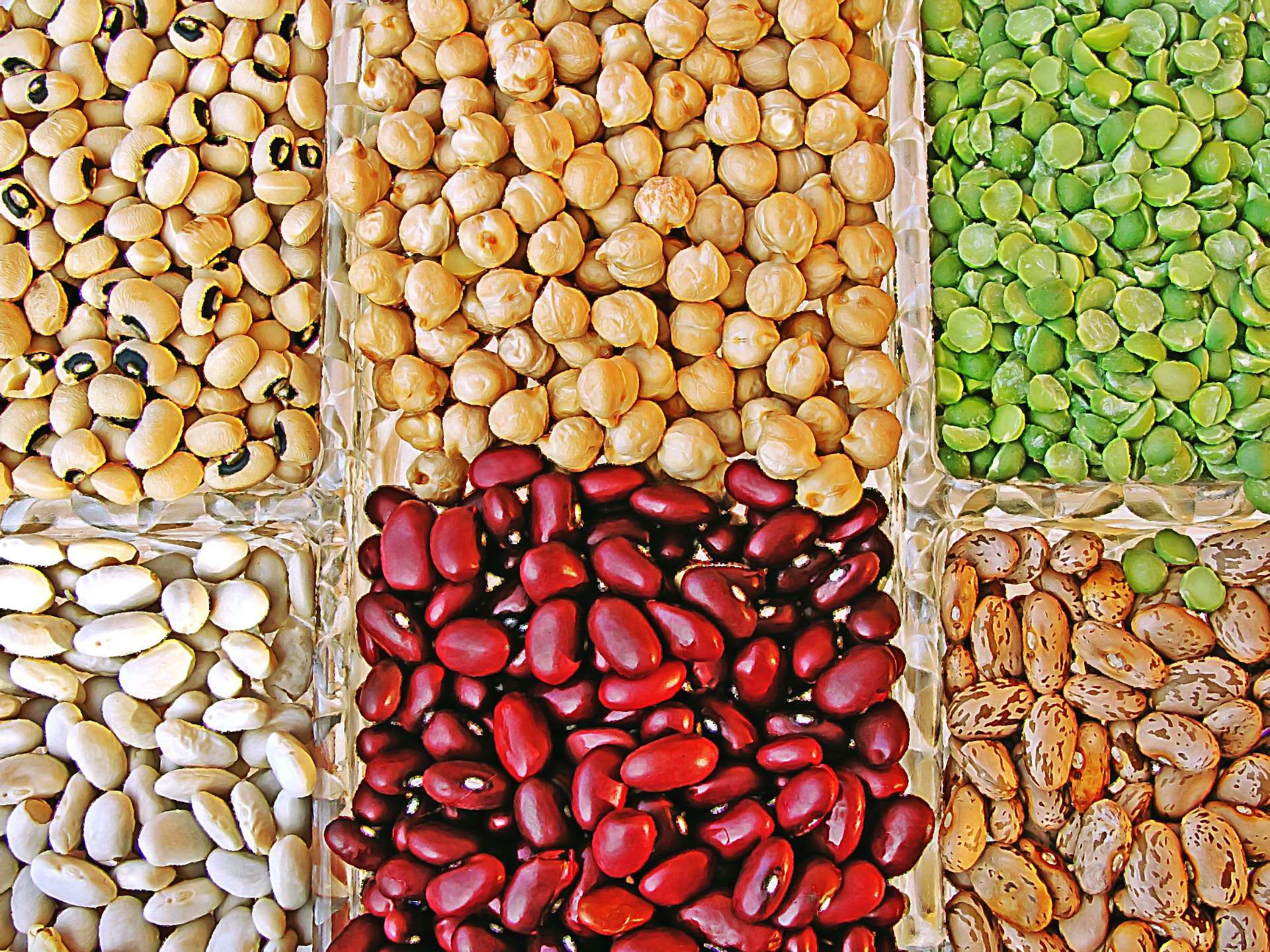
This is often considered to be the “pregnancy vitamin” because it is critical for the production of DNA.
For pregnant women, B9 is super important since deficiencies of this vitamin have been linked to birth defects.
In addition, some studies show that B9 supplementation can be helpful for perinatal depression.
This makes B9 supplements a much safer option than traditional anti-depressants, which are very risky for both mom and child.
FOOD SOURCES: Chickpeas, beets, dark leafy vegetables, asparagus, broccoli, brussel sprouts, citrus fruits, black eyed peas, spinach, great northern beans, green peas, avocado, peanuts, lettuce, tomato juice, banana, papaya, organ meats.
9) Vitamin B12 (aka Cobalamin)
One of the most common nutrient deficiencies in the U.S. and other parts of the world is said to be vitamin B12 deficiency.
This is a scary fact given that B12 helps with adrenal fatigue, enzyme production, prevention of anemia and reducing the risk of heart disease.
Furthermore, B12 is needed for the synthesis of DNA, and along with vitamin B9, it’s essential for pregnant women.
FOOD SOURCES: Yogurt, liver, trout, salmon, tuna, haddock, eggs, milk.
2. FAT-SOLUBLE VITAMINS
As the name implies, fat-soluble vitamins dissolve in fat.
In order for the body to properly absorb this category of vitamins, we first need to have sufficient amounts of fat in our diet and body.
Because the body stores fat-soluble vitamins in the fat cells, there is always a reserve that the body can use.
Therefore, unlike water-soluble vitamins which go out with urine, there is less risk of experiencing deficiencies of fat-soluble vitamins.
However, if you are on a very low fat diet, then you have less fat stores in your body and that can easily lead to a deficiency of these vitamins.
There are 4 fat-soluble vitamins that the body relies on.
1) Vitamin A

Often associated with foods like carrots, vitamin A comes in 2 forms:
- preformed vitamin A (found in animal products)
- pro-vitamin A (found in plant foods)
Vitamin A helps build and maintain healthy skin, teeth, mucus membranes, skeletal tissues and soft tissues. It also helps improve vision and overall eye health.
Some plants have pigments called carotenoids, which can turn into a form of vitamin A when eaten. Beta carotene, famously associated with carrots, is an example of a carotenoid.
FOOD SOURCES: Carrots, watermelon, sweet potato, pumpkin, green leafy vegetables, squash, cantaloupe, bell pepper, beef, eggs, peaches.
2) Vitamin D (Calciferol)
This is commonly known as the “sunshine vitamin” because its production is triggered by exposing the skin to sunlight.
Vitamin D isn’t actually a single vitamin. Rather, the term “Vitamin D” refers to several hormones that are stored in the liver, fat and muscle tissue.
Vitamin D is essential for proper calcium absorption, healthy bones and teeth, and a healthy immune system.
The best way to make vitamin D is to have 20 minutes of sunscreen-free, sun exposure every day (if you’re caucasian). And if you’re of African descent, you need to spend even more time in the sun (an hour or more).
If you live in an area with harsh winters and/or gray skies most of the year, then adding a good quality vitamin D supplement to your diet is a must (particularly because it’s hard to get sufficient vitamin D from food alone).
FOOD SOURCES: Mushrooms, fatty fish (herring, salmon, sardines, tuna, mackerel, eggs, cod liver oil.
3) Vitamin E (Tocopherol)

Along with vitamin C, vitamin E is another one of the body’s main antioxidants. It protects our cells from disease-causing free radicals and premature aging.
Vitamin E also helps the body form red blood cells and use vitamin K.
And lastly, for postmenopausal women, some studies show that vitamin E has a positive effect on hot flashes, vaginal changes, and lipid profile (though the effect doesn’t seem to be as strong as estrogen therapy).
FOOD SOURCES: Sweet potato, mango, papaya, dark leafy greens, olives, blueberries, most nuts, most seeds, tomatoes, avocado.
4) Vitamin K
Vitamin K’s main function is in blood clotting and preventing bleeding.
It also helps increase bone density (which reduces the risk of osteoporosis) and is used as a natural remedy for menstrual imbalances (such as cramps and heavy flow).
FOOD SOURCES: Watercress, onions, fermented foods, broccoli, green leafy vegetables (dandelion, swiss chard and mustard greens, in particular), parsley, asparagus, brussel sprouts, green beans, green peas, carrots, dairy products like eggs and butter.
HOW TO CHOOSE THE BEST VITAMIN SUPPLEMENT FOR WOMEN
While whole food is always the best source of vitamins, supplements can also provide additional nutritional support (NOTE: support, not a substitute for real food).
There are 2 brands that I have personally used throughout the years and I list them below:
Beyond Tangy Tangerine 2.0: This one has always had a special place in my heart because it’s the supplement that helped my cousin after struggling for years with post-hysterectomy weight gain.
Pure Synergy Vitamin Balance: this is a fermented vitamin. The fermentation process is supposed to make the nutrients more bio-available. I have bought various supplements from this brand and overall, I like how much attention they put into the production process.
CONCLUSION
That’s it for this quick overview of how vitamins supports our hormones, skin, energy and so much more.
I hope this was helpful!
For a full review of the products I shared above – as well as an overview of other supplements for hormone support – use this list.
